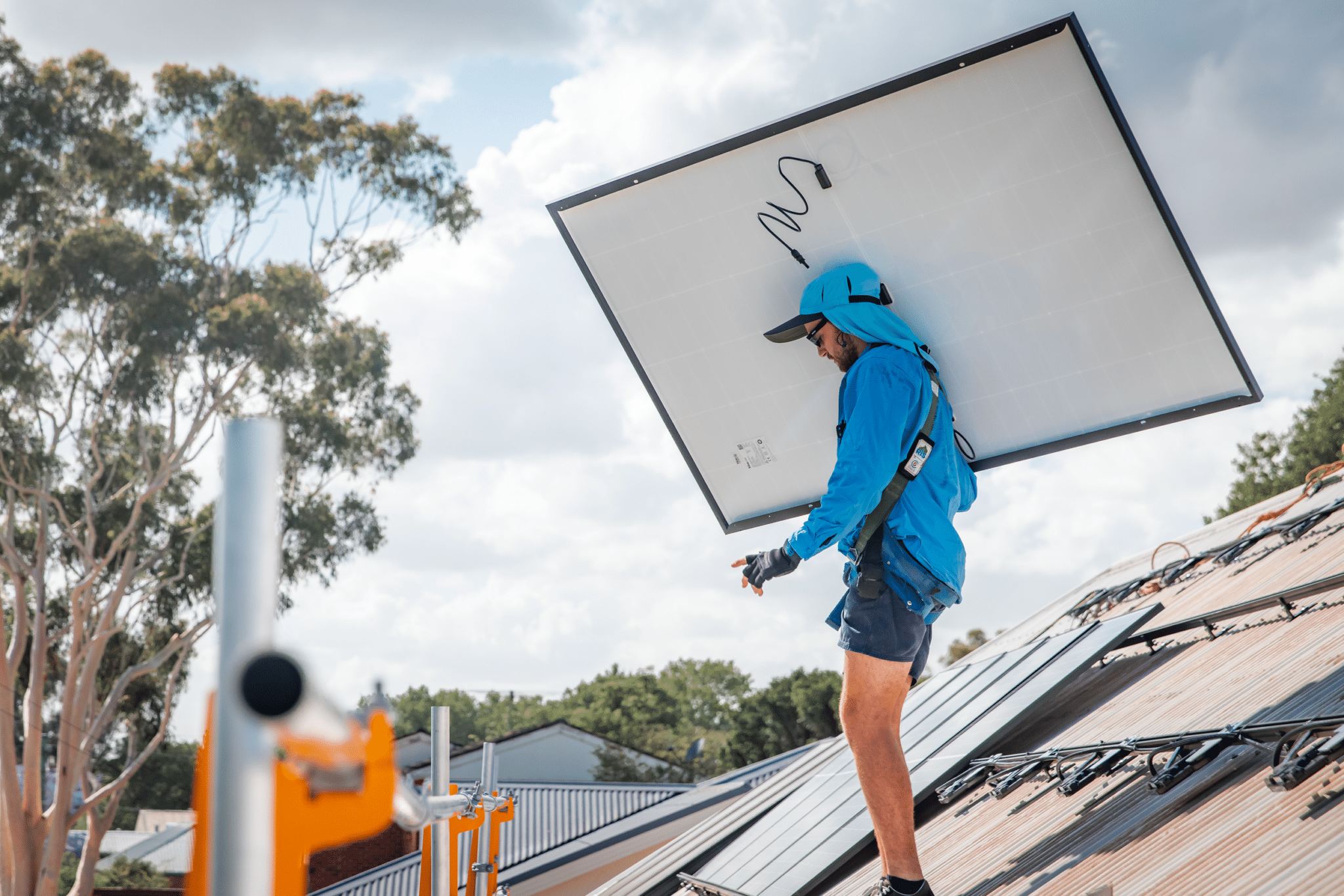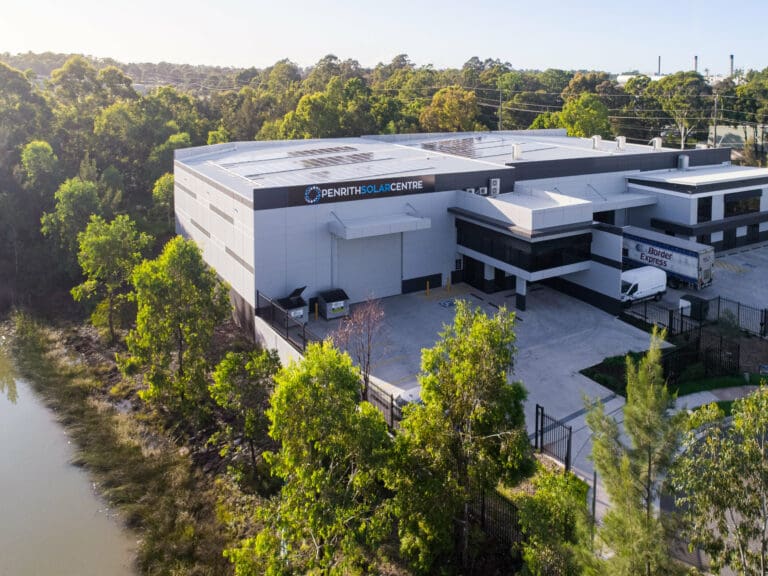One of the biggest decisions you can make once you’ve decided to go forward with the purchase of a new solar system is who you will get to install it. It’s a big choice and an expensive one regardless of who you choose. You want your solar system to work well, look good, and complement your lifestyle. Should you rely on an in-house installation team or is a subcontractor a better option for you?
Before we get started with the article, let’s start with a simple question: what do we mean when we say “in-house” and what is a “subcontractor?”
In-house installers are a top to bottom, inquiry to installation solar systems service. They are certified by the Clean Energy Council. They will handle your questions and installation from the moment you reach out to them to the moment they set up the consumption monitoring app on your phone.
Subcontractors are individual electricians who are also certified by the Clean Energy Council to install solar. They are not a sales company, but instead independent contractors who work for solar companies that sell solar systems. They’re commonly referred to as “subbies.”
At Penrith Solar Centre, we understand how many components go into making decisions around the purchase and installation of your new solar system (or upgrades to an existing one). We want you to pick the option that will give you the greatest peace of mind without spending an arm and a leg. We’re an in-house installation team, but we can certainly see the advantages of subcontractors for some jobs.
In this article, you’re going to learn about:
- In-house Solar Installation: Advantages and Disadvantages
- Subcontractors: Advantages and Disadvantages
- A Little Shameless Self-Promotion: Penrith Solar Centre’s In-house Team
- How Do I Decide Between In-house and Subcontractors?
This article will make you an expert on the differences between in-house installations and working with subcontractors. By the end, you will have a comprehensive understanding of this decision and what’s right for you (or at least give you a better idea of what questions to ask, regardless of who you choose to work with).
In-house Solar Installation: Advantages and Disadvantages
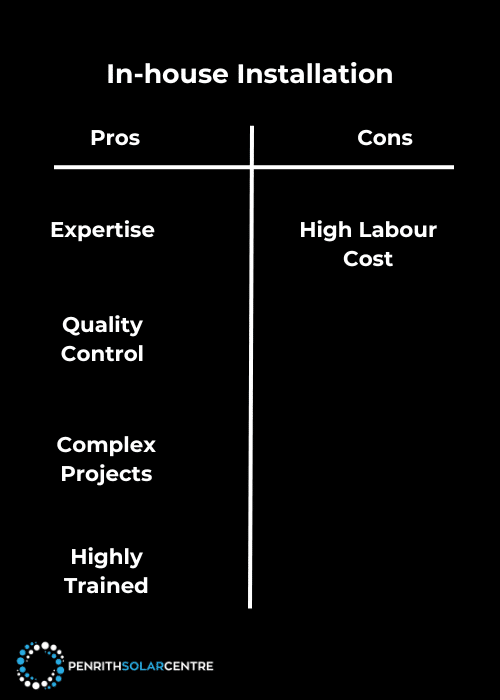
In the great debate between in-house installation or working with subcontractors, you’ll soon realise that going in-house is a complicated option that requires experienced installers, company accountability, and a lot of moving parts to succeed.
There’s a reason why there aren’t a lot of in-house solar installers in the Sydney region.
Advantages of In-house Installers
Expertise/Familiarity with Products: In-house teams often have an extremely high level of expertise in what they do because they are able to focus their entire business around fewer products and processes. And then they become experts in that niche of an entire industry. For example, Penrith Solar Centre, an in-house solar installer, focuses entirely on microinverter solar systems and batteries that compliment those systems. For more information on microinverter solar systems, you might want to check out this article titled, What Are the Benefits of a Microinverter System?
In the realm of solar systems, an in-house team can be trained to be intimately familiar with solar panels, inverters (or microinverters), and installation practices. This expertise will translate into solar systems that can really maximise their energy production (which will ultimately save you money over time).

Quality Control: An in-house team will flex a high degree of control over the entire installation process. While some customers don’t like the idea of that, many others appreciate the entire installation process being taken care of for them.
An in-house team that has a method for installations delivers fewer errors because that’s all they do every day. There’s less of a chance that they’ll have to come back to a site for repairs as well. That level of experience is difficult to match. This translates into long-term savings because of more efficient systems and fewer headaches for you down the road (you won’t need to replace components of your solar system or home because of a faulty installation, something that happens from time to time with subcontractors).
Complex Projects: Highly complex projects may require a specialised skill set. In-house teams are trained to handle these challenges, while subcontractors may not have the same attention to detail.
Ask yourself some of these questions: Is your installation fairly straightforward, or does it involve intricate designs or special requirements? Is it a large project or a small one? Are any special skills needed to get it up and running? The size and complexity of your solar installation should heavily influence this decision.
Ongoing Training: Many in-house installers pride themselves on being trained and up to date on evolving technology in a way that subcontractors aren’t required to. At Penrith Solar Centre, we have a training centre on site that is a classroom for all apprentices who begin their tradesperson journey with us.
Disadvantages of In-house Installers
High Labour Costs: There are so many advantages to in-house installers when it comes to expertise and quality assurance, but that peace of mind comes at a price. An in-house installation company spends money to recruit, train, and keep those skilled installers working for them. It’s an ongoing expense in that business model. The money spent on professional expertise is reflected in the cost of those solar installations.
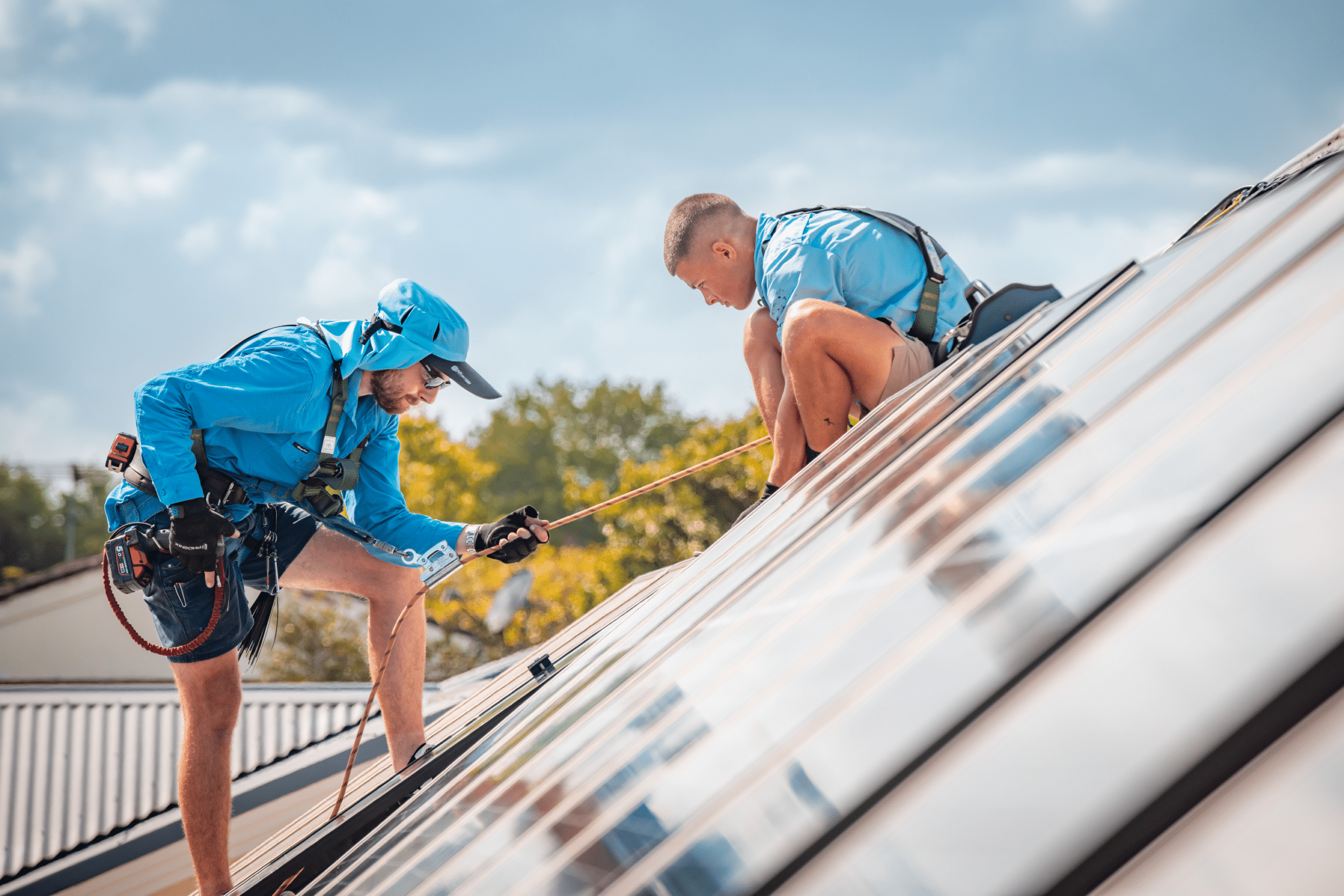
While an in-house team offers more peace of mind for your system over time, you will certainly find a better price with a subcontractor for any solar system less than 8 kW.
With an in-house installer, you will pay the same installation fee for a 16 kW system as you would for an 8 kW system. The labour costs for installation are identical. The value you’ll receive from working with a subcontractor, from a price point of view, is exponentially better than going with an in-house installer. The difference is thousands of dollars.
For example, at Penrith Solar Centre we only install microinverter solar systems. The installation is a fixed cost regardless of the size of the system you might order from us. The price per kilowatt decreases as the size of the system increases, because the installation is a fixed cost.
A 5kW microinverter system from PSC is about $2.00 per watt which equals $10,000.
A 10kW system from us is about $1.30 per watt which only increases the cost up to $13,000. It’s twice the power coming from those solar panels.
If we double it again to 20kW, the system remains about $1.30 per watt which brings the total to $26,000.
Subcontractors are paid for their services by the sales company for the installation of a system. Usually, they are paid per panel. The larger the system, the more the installation costs.
Sting solar systems vary in price and are almost always less expensive than microinverter systems. With a string solar system, you typically pay $1.00 per watt. So a 10kW system will cost somewhere in the neighbourhood of $10,000. That’s approximately $3,000 cheaper than a microinverter system installed by an in-house team.
Subcontractors: Advantages and Disadvantages
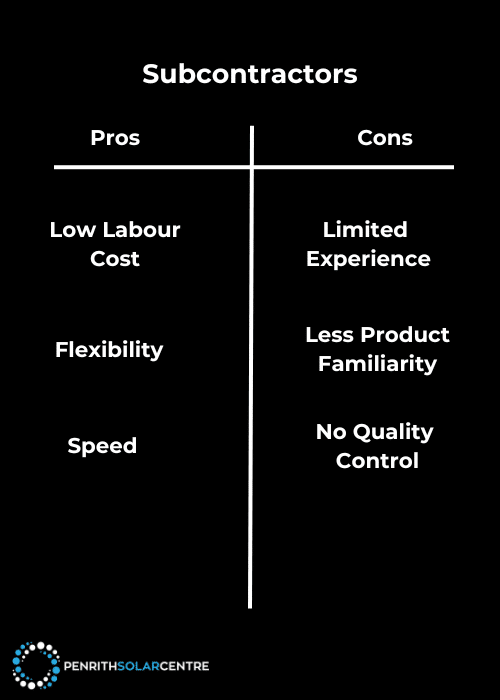
Subcontractors are everywhere in Sydney. There’s no doubt that they are more popular than in-house installation teams. There are benefits to hiring a subcontractor to install your solar, especially when it comes to the cost of your system.
Let’s dive into the pros and cons of subbies.
Advantages of Subcontractors
Lower Labour Costs: This is the biggest advantage of working through a subcontractor to install your solar. It’s cheap. Subcontractors can work on a project-by-project basis and are compensated accordingly. If demand is low, you might be able to score a really sweet deal on a solar installation.
In-house installers pay for the charge appropriately for the quality they offer by hiring electricians with fixed salaries with benefits. They can’t afford the same pricing flexibility subcontractors offer.
Flexibility: One of the biggest advantages of working with a subcontractor is the flexibility they provide. An in-house installer like Penrith Solar Centre is often booked out months in advance, especially during peak installation season when demand is high.
A network of skilled subcontractors can meet the demands of the market without the scheduling that an in-house team requires.
Speed: Because subcontractors get paid by the panel on a job, they’ll get your installation done really fast. That might be something that you value, especially if you’re trying to fit in an install to a very busy schedule.
For more information about string solar systems and how they compare to microinverter systems, you might be interested in reading the following article: Microinverters vs String Inverters: An Honest Comparison.
Disadvantages of Subcontractors
Less Expertise/Familiarity with Products: Subcontractors can be hit and miss when it comes to staying on top of the latest advancements in solar, which is a very rapidly evolving industry. The leaps and bounds that have been made in the solar battery marketplace alone in the past 18 months might not be in a subcontractor’s wheelhouse if they have to also fill their schedule with electrical work that doesn’t involve solar systems. They simply don’t have the time to focus on the latest technology and practices.
If you want to install a microinverter solar system, and it’s a great option for many reasons, you’ll want to make sure your subcontractor has been trained through Enphase University. Installing microinverter solar systems is an incredibly complex installation. The technical requirements have a steep learning curve. Of course, the only way to gain experience installing microinverters is to do installations for those types of solar systems. Do you want your installer to learn on the job? Probably not.
You also have no way of determining whether your home is their first solar installation or if they’ve been doing it for years. They might only have experience with string inverter systems, and you want a microinverter system, but they want the contract so they’ll tell you that they can do it. After all, how different can it be? Pretty freaking different, actually.
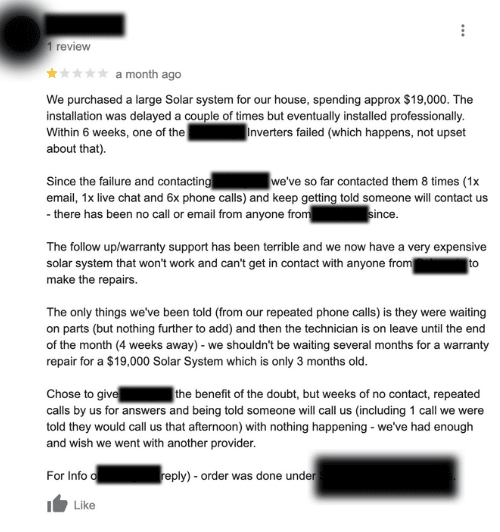
No Quality Control: When working with subcontractors, you should ask lots of questions and study any online reviews you can find about them. Because subcontractors operate independently, they don’t always meet the same high standards that in-house teams bring to a project.
Because they quote at a lower price point, they often need to book 2 jobs in a day to compensate for this. Rushing through a gig can lead to complications down the road, and that can be really challenging for you in the long run.
Because the subcontractor is hired by a solar sales company, there’s a service triangle you’ll need to navigate should your solar system need repairs or warranty fulfilment. The subcontractor will direct you to the sales company that hired them, the sales company will blame the subcontractor, and you’ll be caught in the middle. This situation is particularly challenging when it comes to getting warranties fulfilled. This is awful because while this triangle of sadness is happening, your solar system is out of commission and you’re spending money on grid electricity again.
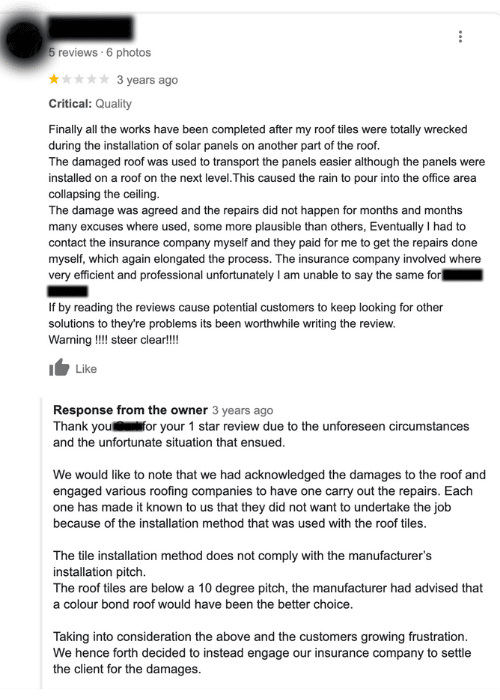
Subcontractors are often electricians first who also do solar installations. They may not install solar day in and day out like an in-house team does. If this concerns you (and it should!), you can invest in setting up some quality control measures such as inspections to make sure that your subbie is adhering to installation guidelines. You might find something that needs to be addressed, and it’s better to have an awkward conversation than to have an incorrectly installed solar that might burn your house down. Not to be dramatic or anything, but with high-voltage DC power, that is always a risk.
A Little Shameless Self-Promotion: Penrith Solar Centre’s In-house Team
Here at Penrith Solar Centre, we take pride in our in-house installation teams.
We’re a company of electricians. Our founder, Jake Warner, has an electrical contractor’s licence, as do all of our head electricians, sales manager, and members of our service department (which is great when you need to troubleshoot something with us).
When you ring our office, you’ll get a hold of the operations team or sales team, who work closely with our marketing team and expertly trained installers (the installers are the real heroes of PSC, though I also hear great things about the guy who writes the blog).
Solar panels have at least a 25-year warranty and microinverters have a 15-year warranty. We put our name on everything we do and we’re proud of it. If there is an error on site, we are the ones who will come to fix it.
Our installers are thoroughly trained and continually updated on the latest solar technology. Their familiarity with our products ensures efficient installations and their dedication to quality aligns perfectly with our commitment to customer satisfaction. This approach has contributed to our reputation as a trusted provider of solar solutions in the Sydney metro area.
Our team is not incentivised by volume but by the quality of our craftsmanship. It’s how we do business, and it’s one of the reasons why we’re the best in the region.

How Do I Decide Between In-house and Subcontractors?
You’ve looked at the advantages and disadvantages of in-house installers and subcontractors and examined a couple of real-world case studies. Let’s sum things up (I love a good summary, don’t you?).
Budget and Cost: Before you pull the trigger on a solar system installation, ask yourself the following: what’s the upfront cost, the ongoing expenses, and the long-term return on investment of in-house teams versus subcontractors?
On a personal level, I wouldn’t eat at a sushi restaurant that advertised “discount sushi.” There’s a good chance there will be repercussions later that need to be considered. If you’re getting a “discount solar system,” remember that it’s not largely different from ordering discount sushi, and you should budget accordingly should anything happen down the road.
Quality and Expertise: If you value quality and expertise, you’ll need to ask whichever type of installer you hire a lot of questions to get the exact solar system for your unique household.
There are subcontractors who do a terrible job, and the solar system needs to be replaced in a couple of years, but there are also subcontractors who do a wonderful job, and their work stands the test of time.
Quality of installation is one of the most crucial things to consider when installing solar. When a solar system fails, whatever the reason, 100% of the time it can be traced back to poor workmanship. It’s useful to work with an installer who stands behind their work and will service your system should anything happen with it.
Project Size and Complexity: Is your installation tricky? Unusual? Is it a microinverter system? Do you need someone to scale a second-story home on a 45° pitch? Well, that last one is ridiculously dangerous, so hopefully not. But do consider the size and complexity of your installation when scouting out quotes to see whose abilities align with your needs.
At Penrith Solar Centre, we encourage you to approach this decision with care and thorough consideration. Assess the requirements for your home and sort out your budget. The choice you make about whether to go in-house or through a subcontractor will impact your solar system, and we want you to make a choice that is right for you.
If you’re interested in learning more about working with an in-house installer, particularly about the cost of a solar system, you might want to check out our article titled How Much Does a Microinverter Solar System Cost?
